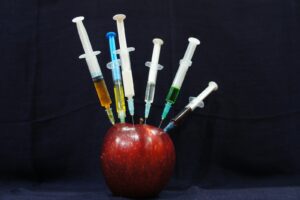 Welcome to our deep dive on a matter that might feel overwhelming at first – drug abuse. Whether you're here to educate yourself, understand a loved one's struggles, or simply satisfy a curious mind, this article promises to guide you through everything you need to know about drug abuse. We'll explore not just the definition, but also the nuances that surround this complex issue. With a focus on clarity and practical knowledge, get ready to uncover insights into what exactly drug abuse entails, the various forms it can take, and how it impacts both individuals and society.
Welcome to our deep dive on a matter that might feel overwhelming at first – drug abuse. Whether you're here to educate yourself, understand a loved one's struggles, or simply satisfy a curious mind, this article promises to guide you through everything you need to know about drug abuse. We'll explore not just the definition, but also the nuances that surround this complex issue. With a focus on clarity and practical knowledge, get ready to uncover insights into what exactly drug abuse entails, the various forms it can take, and how it impacts both individuals and society.
What is Drug Abuse? A Clear Definition
Drug abuse is a term that often conjures up powerful images and emotions, but what does it really mean? At its core, drug abuse refers to the excessive, compulsive, or improper use of substances – including alcohol, prescription medication, and illegal drugs – regardless of the negative health and social implications that unfold as a result. This behavior transcends the occasional indulgence or recreational use, morphing into a pattern that impacts daily functioning and well-being. It's imperative to understand that drug abuse spans a wide spectrum, affecting individuals from all walks of life. Recognizing the gravity and breadth of drug abuse is the first step toward addressing this complex issue that impacts millions globally.
The Different Faces of Drug Abuse
 Drug abuse is not a one-size-fits-all term; it wears many masks and comes in various forms. From the teenager experimenting with illegal substances at a party, to the adult relying on prescription painkillers long after their medical need has passed, the scenarios are as diverse as they are distressing. Abuse can involve substances legally obtained, such as alcohol or prescription drugs, as well as those that are illegal and often dangerous, like heroin or methamphetamine.
Drug abuse is not a one-size-fits-all term; it wears many masks and comes in various forms. From the teenager experimenting with illegal substances at a party, to the adult relying on prescription painkillers long after their medical need has passed, the scenarios are as diverse as they are distressing. Abuse can involve substances legally obtained, such as alcohol or prescription drugs, as well as those that are illegal and often dangerous, like heroin or methamphetamine.
It's crucial to acknowledge that regardless of the substance, the core issue remains the misuse and the harmful consequences that follow. Understanding the different faces of drug abuse illuminates the breadth of this challenge, showcasing that it's a multifaceted problem requiring comprehensive solutions.
Recognizing the Signs: When Does Usage Become Abuse?
 Differentiating between casual use and abuse can be tricky, as the shift often happens gradually. However, several telltale signs indicate when substance use morphs into abuse. Increased tolerance, meaning more of the substance is needed to achieve the same effect, is a key indicator. Likewise, experiencing withdrawal symptoms when not using the substance highlights physical dependency.
Differentiating between casual use and abuse can be tricky, as the shift often happens gradually. However, several telltale signs indicate when substance use morphs into abuse. Increased tolerance, meaning more of the substance is needed to achieve the same effect, is a key indicator. Likewise, experiencing withdrawal symptoms when not using the substance highlights physical dependency.
Additionally, if obtaining and using the drug starts taking precedence over responsibilities, relationships, and interests, it's a sign that usage has crossed into the territory of abuse. Emotionally, individuals may exhibit unexplained changes in behavior, mood swings, or a general decline in mental health. Acknowledging these signs early can be crucial in seeking help and preventing the situation from escalating further into addiction.
The Ripple Effect: How Drug Abuse Affects Us All
Drug abuse extends its impact far beyond the individual; it sends ripples through families, communities, and society at large. Beyond the obvious health implications for the user, it can lead to strained or broken relationships, financial instability, and a significant emotional toll on loved ones. On a broader scale, the consequences manifest in public health costs, increased crime rates, and lost productivity, placing a heavy burden on social and economic resources.
It also contributes to a cycle of disadvantage, exacerbating issues like homelessness and unemployment. Understanding this ripple effect is crucial, as it underscores the importance of addressing drug abuse not just as a personal challenge, but as a complex societal issue that requires a coordinated, compassionate response from all angles.
Breaking the Cycle: Steps to Overcome Drug Abuse
 Overcoming drug abuse is a journey that varies for each individual, but certain steps can pave the way to recovery. Acknowledging the problem and deciding to make a change is the monumental first step. Seeking support, whether through loved ones, support groups, or professional help, provides a network of understanding and encouragement crucial during this time.
Overcoming drug abuse is a journey that varies for each individual, but certain steps can pave the way to recovery. Acknowledging the problem and deciding to make a change is the monumental first step. Seeking support, whether through loved ones, support groups, or professional help, provides a network of understanding and encouragement crucial during this time.
Exploring treatment options, which may include therapy, medication, or a combination of both, tailors the recovery process to the individual's needs. Moreover, developing new hobbies and interests can fill the void left by substance reliance, creating a healthier lifestyle. Lastly, maintaining resilience through setbacks is key, as recovery is a process fraught with challenges. Each step taken towards overcoming drug abuse marks progress in breaking the cycle and rebuilding a substance-free life.
Resources and Support Systems for Battling Drug Abuse
Navigating the road to recovery from drug abuse can seem daunting, but various resources and support systems exist to light the way. From local community centers offering counseling and support group meetings to national helplines providing immediate assistance and information, help is within reach. Online platforms also offer a wealth of information and forums for sharing experiences and advice. Professional healthcare providers, including therapists and rehabilitation centers, play a crucial role, offering personalized treatment plans and support. Furthermore, educational resources can empower individuals with knowledge about the nature of addiction and strategies for managing it. Leveraging these resources and support systems can significantly enhance the journey to recovery, ensuring that those facing the challenge of drug abuse are never alone.
